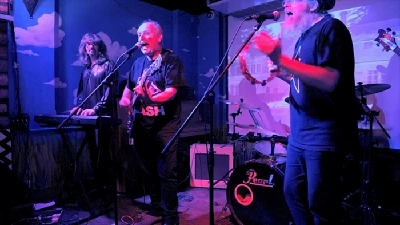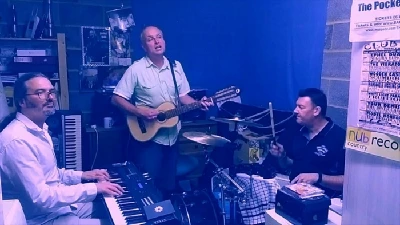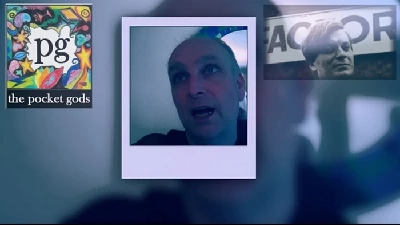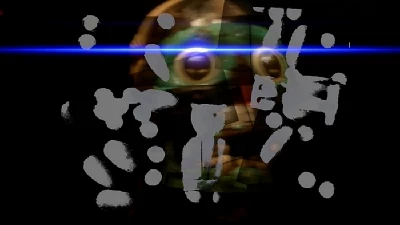published: 14 /
6 /
2019
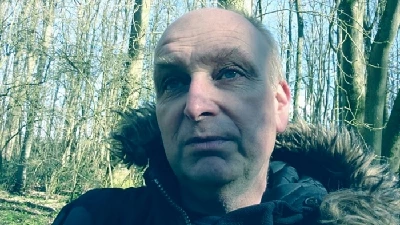
Pocket Gods frontman and now film maker Mark Lee speaks to Fiona Hutchings about what matters to him. From severe mental health difficulties to the tyranny of Spotify, he doesn't hold back.
Article
Despite being lauded by John Peel and gaining a Guinness World Record for the most songs on a digital album, Mark Lee and the Pocket Gods haven't seen the critical or financial success you might expect. Mark Lee is also a man who has struggled with his mental health, a battle that culminated in a suicide attempt in January of this year. He has bravely decided to share this experience in a new film, ‘Weird: The Life and Times of a Pocket God’. He wants to raise awareness of depression in men, which has led to suicide becoming the biggest killer of men under 50.
PB: I wasn't familiar with the Pocket Gods until I watched your documentary. How would you describe your band?
ML: We started out twenty-one years ago as an alt. country outfit, who sounded a like a mad mix of Mercury Rev, Gram Parsons and Big Star. Since then we've been mostly indie pop but experimented with electronica, prog rock and now the thirty second song format which is what we're now known for! I'd describe us as experimental art pop but in a non-pretentious way as humour is very important to us as well as snacks.
PB: How did the idea for the Guinness World Record breaking album come about?
ML: It was by accident to be honest. I'd read an article by Dr Mike Errico in ‘The Independent’ which was about why the pop song became two and a half to three minutes long - mainly due to the length of 7” vinyl. Errico suggested bands should adapt their songwriting craft to the media of today, and consider writing thirty second songs, especially as streaming services pay out such a tiny royalty after a track reaches thirty seconds and then no more. So, I thought why not just do an album of one hundred songs all of which were thirty seconds long. I chose to do one hundred tracks as it looked impressive –‘100X30’. The Guinness people then contacted us to say we'd broken the world record for most tracks on an album. We didn't plan that! Anyway, our latest album ‘300X30’ breaks our own record and is a critique of the music industry. It is trying to raise a debate on how and why we value music - what is the future of music?
PB: Other than sorting fairer royalties for musicians, how else would you fix the music industry?
ML: It's a complex issue that involves us all as consumers. We expect to get it all for free or fifty million songs for just £9.99 a month. It's crazy as it can't sustain new talent. The big established artists are fine as they will get the millions of streams but because of the way Spotfy and it's mysterious algorithms work. It's like pissing, however, in a force 10 gale for new bands starting out. It's all changed.
What used to be the holy grail of bands was getting played on Radio 1 or 6Music. It's now getting on an official Spotify playlist - which is damn near impossible. Even Mark Ronson was moaning about how hard it is to get on those playlists. Your music has to be so many BPM (beats per minute) and hit certain moods and targets, as well as start off with the chorus. Songs can't build and grow anymore. It all has to be immediate ear candy at maximum volume with no dynamics in order to be considered. Oh, and you also need to be famous.
The major labels, which are now only three and Universal, Warner and Sony, won't sign anyone until they've already made it in terms of having millions of followers. Gone are the days when a talent was recognized and nurtured over five or six albums. Albums are pretty much dead because of the playlist, which is why I did our latest album ‘300X30: My Life as a Playlist’. It's basically a three hour playlist where the listeners press play and can sit back for three hours.
The industry will survive, of course, if it survived the internet and Napster and piracy back in the 90s, and it will continue making slaves of us all. The future is more anodyne and mass produced music by either robots or nostalgic holograms or Instagram models, all targeted to hit the right algorithmic notes. It will all be based around playlists - it's like that mad future we saw in the original ‘Rollerball’ film, where life is divided up into big mono corporate cultures such as ‘LEISURE’ and ‘ENERGY’ and everything is digitised.
I think I'm the only person who can see the downside of all this fucking technology like Hive and smart meters and fucking Alexa and smart speakers. Nobody sees the negative impact these things have on the planet in terms of all the energy that is used in making these things and all the precious metals dug up in third world countries on slave labour, just as long as we can say, “Alexa, play me some shit Dua Lipa song” or “Turn up my heating as I'm cold!” It's mental. It's also all about control, What happens when the machines via AI gain control or the government or other organisations steals all our personal data?
I think my next album will be based on these important themes - but there will always be an underground movement for real music with soul and human qualities, as there will always be an underground movement of people who wish to create a more positive human society.
PB: Pocket Gods has been described as you with fifty or sixty other people and producing songs about sex, curries and rock 'n' roll. Was that always the plan from the outset?
ML: No, there was no plan. I'd had a low experience of playing briefly with Scots indie legends the Jesus And Mary Chain and thought if they could do it so could I , which is why I started the band. It's evolved over the years with Noel Storey and myself being the two original members - but we've had some great musicians over the years whom we're all still friends with. People kind of drop in and out as and when. One of our best line-ups was when we had my now wife Claire and her cousin Annelise in the band. We had a halcyon period of drinking, partying and making albums. It was around this period that we had the most success getting played on BBC Radio 1 with Huw Stephens and playing a 6Music session for Tom Robinson.
PB: Who would you cite as your own musical inspirations? Have you ever got to meet and or perform with any of them?
ML: This one is kind of weird (hence the title of the film). We met 70's legend Mungo Jerry, who is famous for the song, ‘In the Summertime’ - which is such a great song. I later found out that this song was no. 1 on the day I was born and I ended up playing the song with him live on stage - such an honour. It's featured in the film.
The other weird thing was that my fave band of all time is the Ramones. I absolutely love them, and I ended up meeting and chatting with the man who signed them back in the 70's, the legendary Seymour Stein. He also signed Madonna and Talking Heads. We ended up getting on really well, and he loved what we were doing with our own label Nub. Since then he's been a mentor to me and he loves the whole thirty second song thing.
PB: I get the impression, from the film, that you are interested in UFOs. How did that come about and what can you tell me about the UK's own Area 51?
ML: I've always believed there was more to life than material reality. I had a few strange experiences when I was young. I had some sort of visitation. Whether you call it an angel or something else, it told me to be strong and that everything would be okay. The day after that my life changed for the worse and I began to get abused by family members. It continued for years and years. I only just survived and kept my sanity in small part to this visitation which gave me hope.
I later got into UFOs from reading ‘The Fortean Times’, listening to ‘Howard Hughes Unexplained’ and watching ‘The X-Files’ (Indeed we did a ‘100X30’ album based on episodes of that series). I live next door now in the Hertfordshire countryside to some weird government base. There' are weird drones flying around...massive security and an underground base...maybe it's somewhere we can all go to when Boris Johnson becomes prime minister?
PB: Count me in! In your film ‘Weird: The Life and Times of a Pocket God’, you talk very frankly about your experiences with mental illness. You mention depression but details of your Borderline Personality Disorder are also featured on screen. You also reference traumatic and abusive experiences you lived through as a child and talk frankly about your suicide attempt in January of this year. When did you first become aware you were living with mental health issues?
ML: I didn't realise what happened to me was different from anyone else which was weird. My parents kept moving around the country, and I kept changing schools, and I wasn't allowed to stay in touch with friends or even my nice grandparents. It wasn't until I broke away from the hold they had on me and went to university that I then realised how fucked up I was. I got through uni by drinking heavily and making friends with similarly fucked up people. I guess you do gravitate to people like yourself.
I avoided sex and sexual relationships as I was petrified. Indeed to cover this up I had to invent fictional girlfriends. I then worked in a record shop (where the band started), still drinking and still not getting help. It wasn't until much later, mainly when I met my now wife, that I realised that if I wanted a future and love then I needed to get some help. So, I started years and years of psychotherapy and treatment ensued for which I'm grateful for.
PB: Did you feel you could access the support you needed then or did you have to reach a crisis first?
ML: I feel like the support used to be there ten years ago, but due to cutbacks and the fact that we are in a mental health crisis that it isn't there anymore. For instance, despite the fact that I tried to commit suicide in January this year, my psychotherapy treatment stopped in June. That's just six months. I'm now left to help myself.
Luckily I've always worked hard on myself in terms of looking after my mental health, and I'm also lucky that have other support from my wife, friends and a great GP. I'm also getting alternative therapies such as Somatic Experiencing from the pioneering Diana Tibble - it's very ahead of the times in the fact it deals with how trauma is stored physically in the body and gets you to release it by exercises you can do yourself.
PB: I noticed you were interviewed in talking about your suicide attempt a matter of weeks after you survived it. Did it feel important to start talking about it as soon as you could?
ML: Yep, I'd changed my mind and was on my way back (Mark had left his home and gone out in the countryside where he had taken co-codamol tablets), but the co-codamol I took made me drowsy and I collapsed. Luckily a police helicopter found me.
I knew then that I didn't want to die, but wanted to put things right and sort my life out. Unfortunately, because they found a suicide note, they had to section me which was the worst experience of my life. It meant being locked in a bright white room with nothing in apart from a crash mat as a bed, with no bedding and nothing to do. You couldn't sleep, and it was hell as all the other patients were going crazy trying to hurt each other or themselves or the guards. I couldn't believe it was like ‘One Flew Over the Cuckoo’s Nest'. I couldn't believe we were being treated like this in the 21st century. Surely there must be a better, more humane way of dealing with people who've just been through such trauma. I was thinking we would treat prisoners of war or murderers better than this. So, I was very keen to get out and start telling people what it was like and how not to get there!
PB: I know you want to open up the conversation around mental health because suicide remains the biggest killer of men under 50. You have also posted about it on social media. Are people responding and talking to you about their experiences?
ML: Yes. I did deliberate for a while whether to go public on Facebook about it, but I did and was amazed by the response that I got, especially from blokes. I live in the country and I had big, burly farmers coming up to me saying, "Well done, mate! It needs to be said." I've also encountered people who had similar financial difficulties to me, whom I've been able to help. One of my mates Billy Samson, from the Scots band the Paraffins, was a great support when I'd come out of hospital. He sent me some lovely messages. I then found out he had thrown himself off a car park in Kilmarnock. I'd had no idea he was struggling, so was completely gutted that he felt like that and I didn't know. So, we must continue encouraging men to talk.
PB: Did you find making the film difficult or therapeutic or somewhere in the middle?
ML: It was difficult to make both technically, as I had to learn how to film and edit, and also emotionally. It was hard as I was trying to be as honest as possible, and had to revisit the places where I had the breakdown and suicide attempt, but it was healing as well. If I can get something positive out of this, then it will make it slightly better even if stops one person from doing what I did.
PB: Did you make the film alone? Where did the idea come from?
ML: I did most of it myself on my phone, but had a lot of help from Guy from Nub and also Dave who did some great filming of the Pocket Gods live.
PB: What do you want people to take from your film? Other than snacks are important?
ML: Yes, snacks are the new cool, don't you know? Just wanted to tell my story and reach out if possible to say there is hope out there and that this is a beautiful world, but sometimes we just can't see it. The greatest power we have is the ability to control our mind. Once you have mastered that, you can do anything!
PB: You've said you feel like your best work is yet to come. Do you have any hints as to what that might be?
ML: Ha, just some great normal songs (three minutes) and not some novelty album, as some have called the thirty second song LP, sung from the heart.
PB: How can people find the film and keep in touch with you on social media?
ML: It's out on Amazon Prime in July and you can follow us hereL
facebook/thepocketgods
instagram/markchristopherlee
#weirdthemovie
PB: Thank you.
Band Links:-
http://www.facebook.com/thepocketgods
https://twitter.com/weirdthemovie
http://www.instagram.com/markchristoph
Play in YouTube:-
Picture Gallery:-
